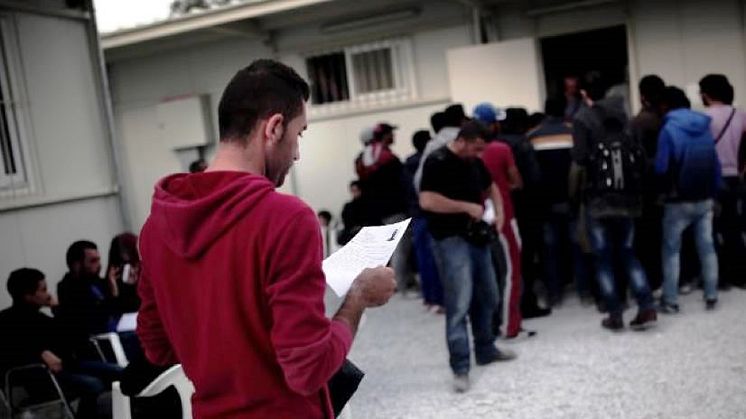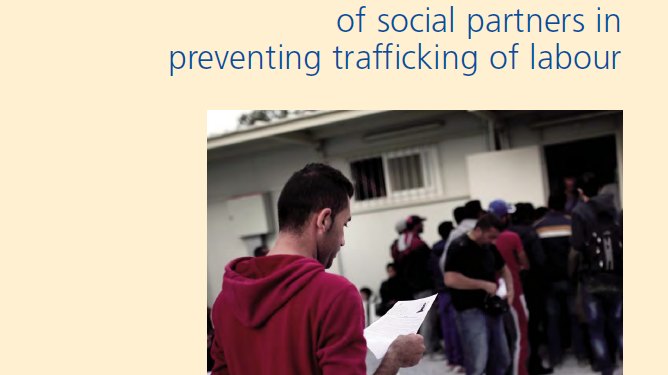
Blog post -
Tackling Trafficking For Labour Exploitation In Europe: New Way Forward Together
This article by Andrea Fromm was originally posted on Social Europe Journal, to view it please click here.
The European Union (EU) has strong legislation in place that protects workers from being exploited and also enables businesses to engage in fair competition. Workers are mobile and can move freely within the EU single market across borders – without being dependent upon traffickers. Yet, the latest Eurofound report shows that trafficking for labour exploitation in Europe does exist. Eurostat’s latest figures show that 19% of all identified and presumed victims were trafficked for the purpose of labour exploitation, sexual exploitation being excluded. Our report urges stronger implementation of regulation and joint action by social partners to crack down on trafficking for labour exploitation.
Labour market intermediaries (LMIs) such as temporary work agencies help to facilitate the mobility of workers through matching workers with companies’ needs. According to the Structural Business Statistics more than 33,000 temporary work agencies operate in Europe aiding job matching and mobility within and across borders. So clearly there should not be any business for individuals or companies engaging in illegal trafficking within or across EU Member States. But, unfortunately, there is.
In some cases, LMIs use their role to recruit or transfer workers unlawfully. They deceive workers about the nature of the job, the employer, the location or other conditions related to the work, and these workers end up working under exploitative conditions.
In 2011 the EU adopted the Anti-Trafficking Directive. The directive emphasises that trafficking is a serious crime and a gross violation of fundamental rights. The EU Strategy towards the Eradication of Trafficking in Human Beings 2012–2016 complements the legal rules with targeted actions – and recruitment by LMIs is indeed one area of concern.
It is puzzling that, although trafficking for labour exploitation has been criminalised at EU level, the recent numbers, according to Eurostat, of prosecuted traffickers are stagnant. The Eurofound report provides one possible answer. It finds that monitoring LMIs needs to be strengthened to achieve greater enforcement, sanctioning and prosecution. The report also shows that building tripartite partnerships, including across borders, is necessary to implement coherent activities. One way of preventing LMIs from engaging in trafficking is by monitoring their compliance with national rules and regulations.
Regulating the operation of LMIs takes a variety of forms in the 28 EU Member States and Norway (which also participated in the study). Registration or licensing schemes are common across Europe to monitor who is operating an LMI and to ensure compliance with minimum standards in running the business. Yet coverage of registered, licensed or certified LMIs is inadequate. This contributes to the challenge of sanctioning illegally operating LMIs that are engaged at the entry point of trafficking.
Greater commitment of and cooperation with social partners is also needed. Member States and public authorities in particular can benefit from social partners’ expertise on working and business conditions and their networks to fight trafficking. Involvement of the social partners in international and European initiatives, awareness-raising campaigns, establishing complaint mechanisms, developing codes of conduct, distributing educational material and engaging in cross-border cooperation with other trade unions or employer organisations are underway.
Yet a tripartite partnership to tackle trafficking has been created in only one country of the EU – the Czech Republic. Targeted policy interventions were developed, cross-border cooperation initiated, a tripartite working group established. In addition the number of inspections was increased, training was broadened to relevant groups, a cooperation agreement by the social partners signed and the compilation of a company blacklist agreed.
Tackling trafficking for labour exploitation is not only an important way to facilitate free and safe mobility of workers and the effective functioning of EU labour markets. It is also an essential tool to boost fair competition. Above all, however, it is the commitment of the EU as enshrined in the Charter of Fundamental Rights to protect people’s basic human rights against violations in order to create an area of freedom, security and justice.
A better and dedicated partnership between governments and social partners is needed to ensure not only freedom from being trafficked and exploited but also freedom to live and work in dignity.
Related links
- Download the report Regulation of labour market intermediaries and the role of social partners in preventing trafficking of labour
- Image © European Union, 2015 - Source EC - Audiovisual Service - Photo by Tzortzinis Angelos
- Image © European Union, 2015 - Source EC Audiovisual Service, Photo by Tzortzinis Angelos

